|
Simon Killer, the troubling but arresting second film from Afterschool's Antonio Campos, is something of a rarity for Eureka's Masters of Cinema label. A relatively new film – it was only released in UK cinemas earlier this year – it differs from the vast majority of titles on the label in that, for all its many qualities, it has yet to prove its longevity. It's not the label's first such venture – their first Blu-ray release was Johnny To and Wai Ka Fai's then recent Mad Detective, a strong film to be sure, but one that did not exactly meet with universal acclaim. Both are films that Eureka picked up for UK distribution and clearly believed were of a quality that justified putting them out under the Masters of Cinema banner.
Many will doubtless question whether a recently released second film by a relatively new director can really warrant such prestige branding, and that's fair enough. Only time will tell if Eureka's faith in Campos as a filmmaker and the lasting impact of his work is justified, but speaking personally, the inclusion of exciting or challenging new works alongside the expected catalogue of established classics and overlooked gems is more than welcome and will hopefully be repeated (and their promised home video release of Andrew Bujalski's Computer Chess suggests that it will be). It's a strategy that has already been successfully road tested over the pond by Criterion, whose range of classic and cult favourites has been peppered with new works by the likes of Wes Anderson, Andrea Arnold, Lena Dunham and David Gordon Green.
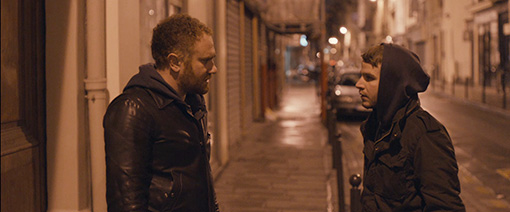
Whether Simon Killer is a film that deserves such attention will be in the eye and the ear of the beholder, and I've no doubt that some will wonder out loud what Eureka were thinking. Not us. Indeed, my fellow reviewer Timothy E. RAW's coverage of its cinema release was so enthusiastic that extracts from it ended up on the Masters of Cinema press release. You can read that review here, which is accompanied by Tim's interview with director Antonio Campos (and yes, the spelling error on the name caption is down to me).
I'll freely admit that it took two viewings for me to be as bewitched by the film's qualities as Tim, but it's worth noting that the second viewing took place soon after the first because I just couldn't get the damned thing out of my head, and second time around I was completely sold. What really hit home is nailed by Tim in the last paragraph of his review, that we are watching a troubled young man taking his first steps on the road to becoming a fully fledged monster. In this respect the film can be seen as a natural companion to Michael Haneke's The White Ribbon, in which oppressive parental attitudes are shown to be shaping the children of a small German village into future Nazis. What disturbs so much about Simon Killer is the almost complete absence of such clear behavioural influences, making it harder for us to distance ourselves from its troubled protagonist. As played by a quite superb Brady Corbet, Simon feels both real and unsettlingly familiar, like someone I once knew or, in some small way in the darkest days of my teenage years, a person I feared that I might become.
The film was shot the Arri Alexa, a pro digital camera that's become something of a favourite with cinematographers for its low light capabilities and crisp, film-like results. Framed 2.40:1, the image grading varies on a scene-by-scene, making it initially tricky to judge the quality of the transfer with real precision. But hop forward to the tail end of chapter 10 when Simon is agitatedly sitting outside a café with Marianne and repeatedly standing up to take phone calls and you get a clearer idea: the colours here are natural, the detail sharp and the contrast spot on. The vivid red light of the bar/brothel is also nicely captured without any obvious banding or other digital issues. A really solid job.
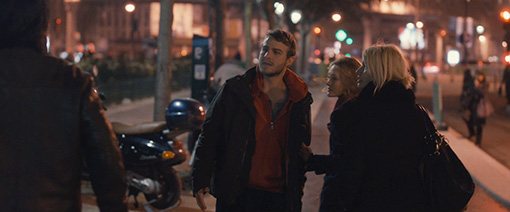
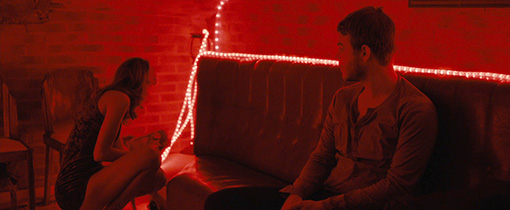
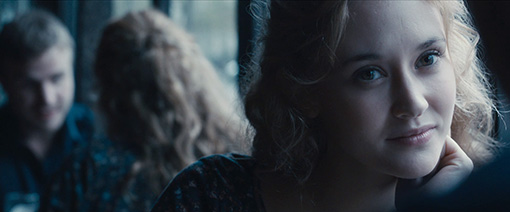
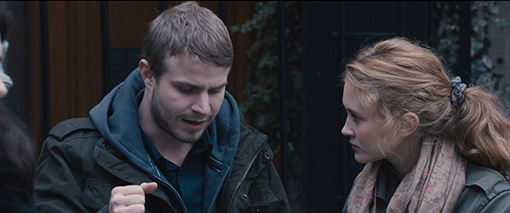
The DTS-HD Master Audio 5.1 surround track is crystal clear whatever the audio content of the scene, though is surprisingly front-weighted in the Paris exteriors, where you almost expect the surrounds to be more active. Where the track really does explode into life from every direction is when the film's killer music soundtrack is brought to the fore, delivering deliciously rich sound at a glass rattling volume and far and away the beefiest LFE bass I've heard all year. Excellent stuff.
Pleasingly, you are offered the choice to play the film with English subtitles for the French language dialogue, with full English subs for the hearing impaired, or with no subtitles at all if your French is up to it.
The Last 15 (17:33)
Antonio Campos's Palme D'Or-nominated 2007 short begins with a teenager blowing his brains out at the family dinner table, then hops back in time to observe the fifteen minutes that led up to the suicide. Or does it? Signs of the emerging Campos style are clearly visible in the slowly executed back-and-forth pans and the way the camera observes David's troubled state of mind rather than exploring the reasons behind it, at least beyond his inability to cope with the familiar teen pressures of family, education and long-term debt. These are referenced literally though captions outlining the income of individual family members and metaphorically though the apartment's slowly collapsing ceiling. The handling is appropriately unsettling in the manner of The Seventh Continent-era Michael Haneke, and the increasingly oppressive blend of chatter and background television that builds in volume as zero hour approaches, though far from a new trick, is most effectively employed here.
The Case of the Conscious Camera (28:54)
Now this is interesting. Zach Wigon kicks off an interview with Antonio Campos by asking him to frame the shot as he would if it was a sequence in one of his films. This takes some time, but once we going Wigon asks some seriously interesting questions, focussing on specific shots and scenes and prompting Campos to deconstruct the thinking behind them in enthralling detail, more so than he would have had time for on a commentary track, where you have to keep pace with the film as it plays. Especially interesting is his notion of the conscious camera and a discussion on the specific geometry of framing. It ends on a rather amusing note, as Wigon poses a long and complex question that Campos responds to with no more than an affirmative "mmm".
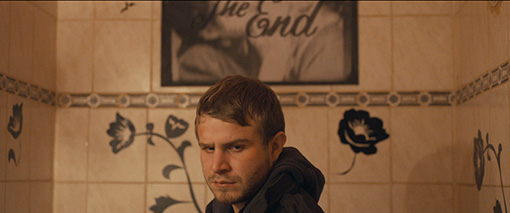
Sundance Alumni Spotlight (15:50)
A lively interview with Campos and his regular collaborators Sean Durkin (whose Martha Marcy May Marlene has also recently made its mark) and Josh Mond, hosted by Chris Gethard and recorded in June 2012. The three reveal how they met and discuss in entertaining detail the ups and downs of forming a film collective and how it eventually led to Campos and Durkin making their first features. There's some great stuff here, not least their memories of taking their 2005 short Buy It Now to Cannes and Campos's claim, when discussing the collective's early days, that "There is stuff that we did that we will never tell anyone we did." It's also Campos who provides the soundest advice to aspiring filmmakers when he suggests they take a big risk creatively but not financially.
Conversations with Moms (6:00)
Six minutes long and as much fun as anything I've seen all year, here Chris Gethard interviews writer-director Campos, leading man Brady Corbet and both of their mothers. It sounds a daffy idea but it's actually a blast, as Gethard kicks off by asking the ladies what went wrong with their sons and the guys fall about laughing as their mothers prove to be as smart and tolerant (and at one point as comical) as all of us hope our parents will be. An unexpectedly marvellous extra.
Behind the Scenes (20:47)
Just as The Case of the Conscious Camera was no ordinary interview, this proves to be no straightforward behind-the-scenes featurette. Campos provided filmmaker David Formentin with alternative takes, unused original score and footage shot by Joe Anderson on a Canon 5D before and during the production and allowed him to experiment. And experiment he does in mesmerizing fashion, matching movements, gestures and framing on the 5D footage with similar images in the film itself and successfully reproducing key aspects of the feature's mood and tone. Despite having no overriding narrative, it feels more structured and complete than any other behind-the-scenes piece I can readily recall.
Trailer (2:11)
Does the job without revealing just how uncomfortable the film can get. Then again, how could it?
Booklet
Another strong and well-featured MoC booklet, with a perceptive analysis of the film by Karina Longworth, a really useful interview with Antonio Campos by Craig Keller (cinematographer Joe Anderson chips in to talk about working with the Arri Alexa), an equally captivating and revealing one with Brady Corbet by Hans Morgenstern, an essay detailing the evolution of the poster for the film by its designer Brandon Schafer (including some of his sketches and a a number of different poster designs), credits for the film and a rather nice photographic portrait of the crew.
A risky one to include in the Masters of Cinema label perhaps, but it gets our vote and then some – frankly it's great to see bold and chance-taking new films like Simon Killer getting such a fine presentation and such excellent special features. If you're up for the film then this has to come highly recommended.
|